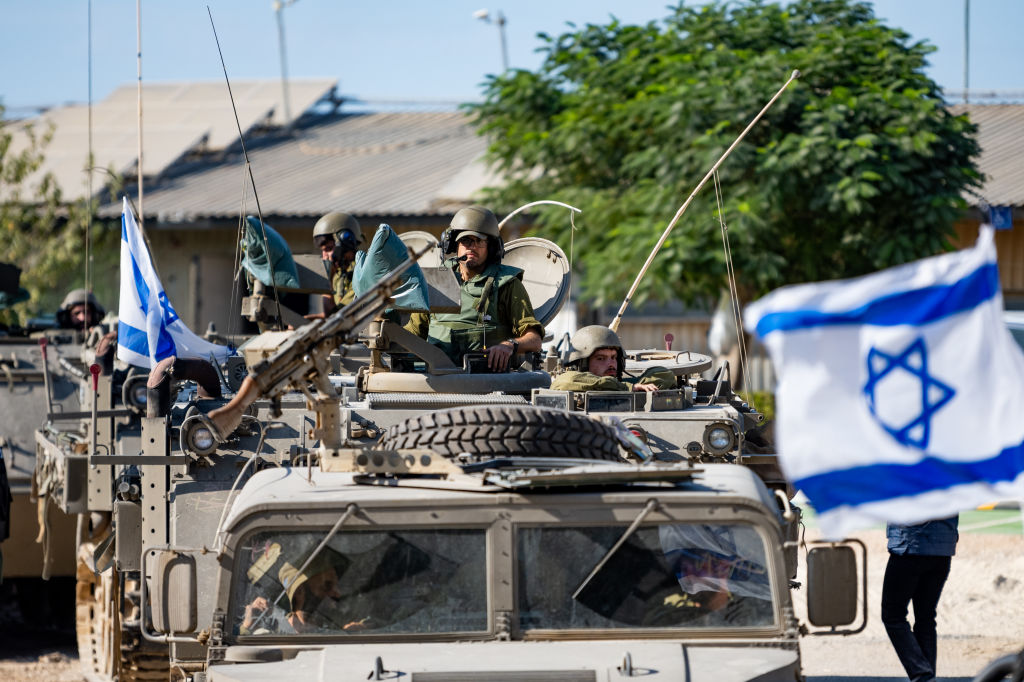The Israeli military said on Wednesday that regular infantry and armoured units were joining its ground operations in Lebanon, stepping up pressure on foe Hezbollah, as it prepared to retaliate against Iranian missile strikes.
Already battling Hamas in Gaza, Israel is beefing up its presence in south Lebanon in its conflict with Hezbollah a day after it was attacked by Iran, raising fears the oil-producing Middle East could be engulfed in a wider conflict.
Iran said on Wednesday the attack – its biggest assault on Israel – was over barring further provocation, but Israel and the United States promised to hit back.
The violence continued on the Israeli-Lebanese border on Wednesday.
Israel’s addition of infantry and armoured troops from the 36th Division, including the Golani Brigade, the 188th Armoured Brigade and 6th Infantry Brigade, suggests that the operation may move beyond limited commando raids.
The military has said its ground operation is largely aimed at destroying tunnels and other infrastructure on the border and there were no plans for a wider operation targeting Beirut or major cities in southern Lebanon.
It issued new evacuation orders for around two dozen towns along the southern border.
Hezbollah said Wednesday it was clashing with Israeli troops in the border town of Maroun el-Ras after it had pushed back troops near another border town. The group said it had also fired rockets at military posts inside Israel.
There was no immediate comment from Israel.
Israel renewed its bombardment early on Wednesday of Beirut’s southern suburbs, a stronghold of the Iran-backed group, with more than a dozen airstrikes against what it said were targets belonging to Hezbollah.
Lebanon’s telecommunications minister Johnny Corm said on X that a cellular transmission tower had been destroyed.
Despite calls for a ceasefire from the United Nations, the United States and the European Union, fighting between Israel and the Lebanon-based Hezbollah has continued.
Nearly 1,900 people have been killed and more than 9,000 wounded in Lebanon in almost a year of cross-border fighting, with the most in the past two weeks, according to Lebanese government statistics. More than a million people have been forced to flee their homes.
Malika Joumaa, from Sudan, was forced to take shelter in Saint Joseph’s church in Beirut after being forced to flee her house near Sidon with her husband and two children.
“It’s good that the church offered its help. We were going to stay in the streets, where would we have gone? We were (sheltering) under the bridge, it is not safe, if we go back home, it is not safe, they are striking everywhere.”
FEARS OF FURTHER VIOLENCE
Iran’s state news agency said three Israeli military bases had been targeted.
Ibrahim Jafari, an advisor to the General Commander of Iran’s Revolutionary Guards, said a cyber operation was launched along with the missile strikes which reached their targets.
The general staff of Iran’s armed forces said any Israeli response would be met with “vast destruction” of the latter’s infrastructure.
Iran’s foreign minister said the assault was over unless Israel decided to retaliate – in which case, it would respond even more forcefully.
Like a similar attack in April, the latest strikes caused minimal damage. One Palestinian was killed.
Israeli Prime Minister Benjamin Netanyahu has vowed to strike back, saying there is nowhere in the Islamic Republic that his country can’t reach. U.S. news website Axios reported that a retaliation within days that could target oil production facilities inside Iran and other strategic sites.
On social media, Iranians were apprehensive about Israeli retaliation and said past wars, such as the eight-year conflict with Iraq in the 1980s that killed about a million people, would only bring more suffering.
“The destruction of generations, young people being cannon fodder, the enrichment of generals and elites, and the empowerment of extremists? Leaders will not pay for dragging Iran into war,” said Nima Mokhtarian, who works at an NGO.
Iran’s missile strikes and Israel’s operations in Lebanon have caused alarm around the world, as Tehran’s Middle East proxies — Hezbollah, Yemen’s Houthis and armed groups in Iraq — show no let up in attacks in support of Hamas.
German Chancellor Olaf Scholz called on Iran and Hezbollah to immediately end their attacks on Israel and warned that Tehran risks inflaming the entire region.
Russia said the conflict was escalating in an alarming direction and Japan said it is deeply concerned by the situation.
Iran said Tuesday’s assault was a response to Israeli killings of militant leaders including Hezbollah chief Hassan Nasrallah and attacks in Lebanon against the group and in Gaza.
Iran’s ally Hamas leader Ismail Haniyeh was assassinated in Tehran on July 31. The attack was widely blamed on Israel, which has not claimed responsibility.
Washington said it would work with longtime ally Israel to ensure Iran faced “severe consequences” for Tuesday’s attack, which Israel said involved more than 180 ballistic missiles.
Israel activated air defences against Iran’s bombardment on Tuesday and most missiles were intercepted “by Israel and a defensive coalition led by the United States,” Israeli Rear Admiral Daniel Hagari said in a video on X.
(REUTERS)




















